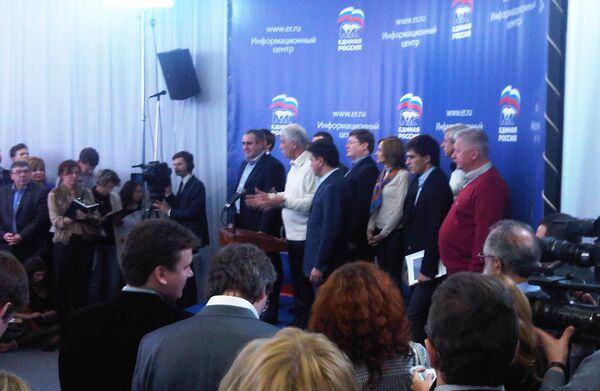Russian Prime Minister Vladimir Putin’s United Russia party failed on Sunday to win a majority in legislative elections, exit polls showed, confounding forecasts and confirming waning popular enthusiasm for the country’s dominant political organization.
United Russia won 46 percent of the vote for seats in the new State Duma, the lower house of parliament, according to the Public Opinion Foundation (FOM), a Kremlin-favored polling institution, according to exit poll results broadcast on the NTV national television network.
Results from another exit poll conducted by the Russia Public Opinion Research Center (VTsIOM), also broadcast on Rossiya-24 just after 9:00 p.m. Moscow time (17:00 GMT) when the last polls closed in the westernmost Russian exclave of Kaliningrad showed United Russia picked up 48.5 percent of the vote.
Both polls put the Communist party in second place, with FOM putting their support at 21 percent and VTsIOM placing it at 19.8 percent. Both put the moderate A Just Russia party in third place, followed closely by the nationalist Liberal Democratic Party. The liberal Yabloko party scored around four percent falling short of the 7-percent barrier.
The first official vote-count results were not expected to be published until later Sunday or early Monday.
But the first indications provided by the exit polls stunned observers of the vote in which the United Russia party, the political organization with which Putin has been closely associated for the past decade, was widely expected to capture a majority of seats in the new State Duma.
“This brings in a risk of the second round in the presidential elections in March, which the Kremlin would not like to happen,” said Yevgeny Minchenko, a political analyst. “It will depend upon whom other parties nominate and how well they campaign.”
Moreover, now the United Russia that had enjoyed a 70-percent majority in the previous Duma, will have to negotiate with other parties over different issues, including their nominations and the distribution of powers within the lower chamber of parliament.
“By all means, this is good for the development of political culture in Russia,” the analyst said.
Voter surveys conducted in the run-up to Sunday’s elections had forecast that United Russia, which has enjoyed a Constitutional majority for the past four years, was likely to fare worse in this vote. None predicted, however, that the party would not win the simple majority.
Putin, 59, who served two terms as president from 2000 to 2008, last month accepted United Russia’s nomination to run again as its candidate for president in elections scheduled for next March.
He has said on several occasions that should he be returned to the Kremlin, he would appoint the current president, his own hand-picked successor, Dmitry Medvedev, as prime minister in the new government, provided United Russia turned in a good showing in Sunday’s elections. Medvedev topped the ticket of United Russia.
If the exit poll data are confirmed by officials results, the outcome of the vote means that United Russia will need to cooperate with the country’s other main political parties in order to push through Kremlin initiatives.


